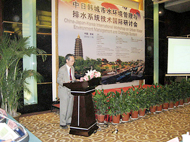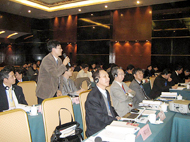Events
China - Japan - Korea International Workshop on Urban Water Environment Management and Drainage System
Date: January 16 - 21, 2010
Venue: Workshop: Conference Hall, Changzhou Grand Hotel, Changzhou, China
Site visit: Changzhou city and Kunming city, China
Hosted by:
- Changzhou Construction Bureau
- Changzhou Environmental Protection Bureau
- Tsinghua University
- Japan Global Center for Urban Sanitation
- Korean Society of Water & Wastewater
Organized by:
- Changzhou Drainage Administration
- Changzhou Institute for Environmental Protection
- National Institute for Land and Infrastructure Management
- Ministry of LITT
- Korea Water and Wastewater Works Association
Co-organized by:
- Changzhou Subproject of National S&T Water Major Project of China
- Kyoto University Global COE Program “Global Center for Education and Research on Human Security Engineering for Asian Megacities”
- Kyoto University EML program “Environmental Management Leader”
Number of attendants: about 80
Report 082
Outline
Water quality of Lake Tai in Changzhou and Dian Lake in Kunming of China has been rapidly deteriorating. Appropriation of comprehensive water quality management tools including the control of river water and sewage and their implementations are urgently required to improve the water quality of both lakes. In this workshop, water and environment specialist groups from China, Japan, and Korea assembled to introduce and discuss water environment management tools applied in urban areas of each country and lake water quality management. The workshop intended to provide a better understanding of the current situation of urban water environment management and future plans of each country. Additionally, we conducted a site visit program mainly to water and sewage works-related facilities, to help the participants formulate more efficient and practical measures and establish future cooperative relationship.
Report
The current situations in urban water environment management of Changzhou, China and Korea along with their future plans were presented first in the workshop. The China group specifically introduced current and future management plans of Lake Tai as a representative case of Chinese water environment pollution management. The Japan group gave presentations on the establishment of international networks in sewage works developed by GCUS (Global Center for Urban Sanitation) of Japan. They also brought up various management tools and technical evaluation methods for urban water environment, as well as lake water management tools that had been applied in Japan until then. About 80 participants including many working-level officials and water environmental researchers joined the workshop and generated lively discussion. The site visit program to Changzhou and Kunming was very helpful in understanding their current sewer and sewage treatment systems, and making a good relationship with Chinese authorities. Visiting the most polluted lakes in China (Lake Tai of Changzhou; Dian Lake of Kunming) particularly gave us an excellent opportunity to deeply understand water environment situation and management tools of China.


